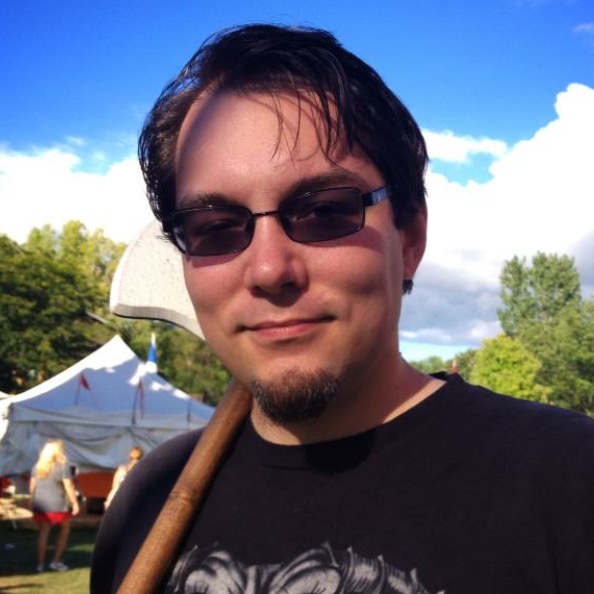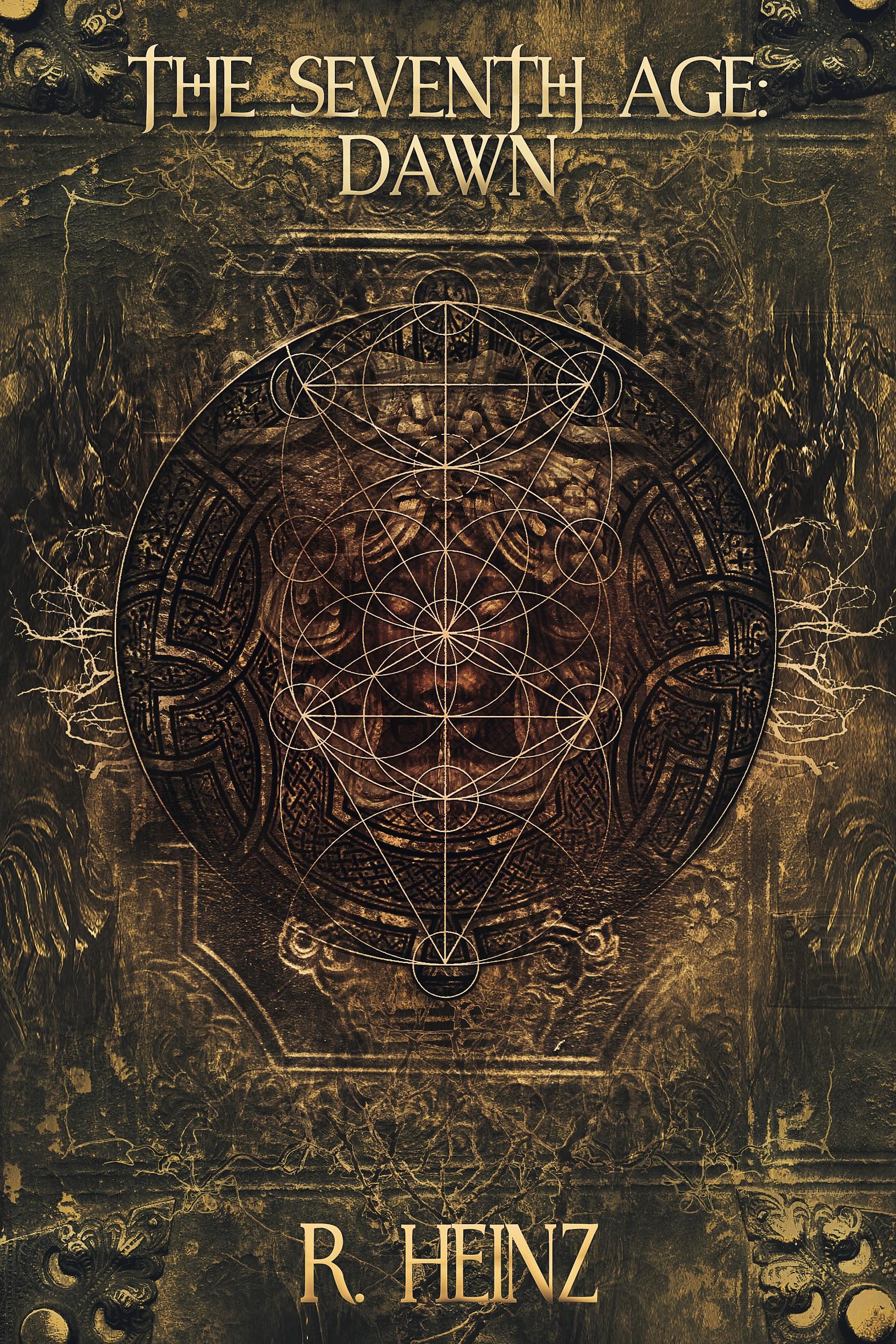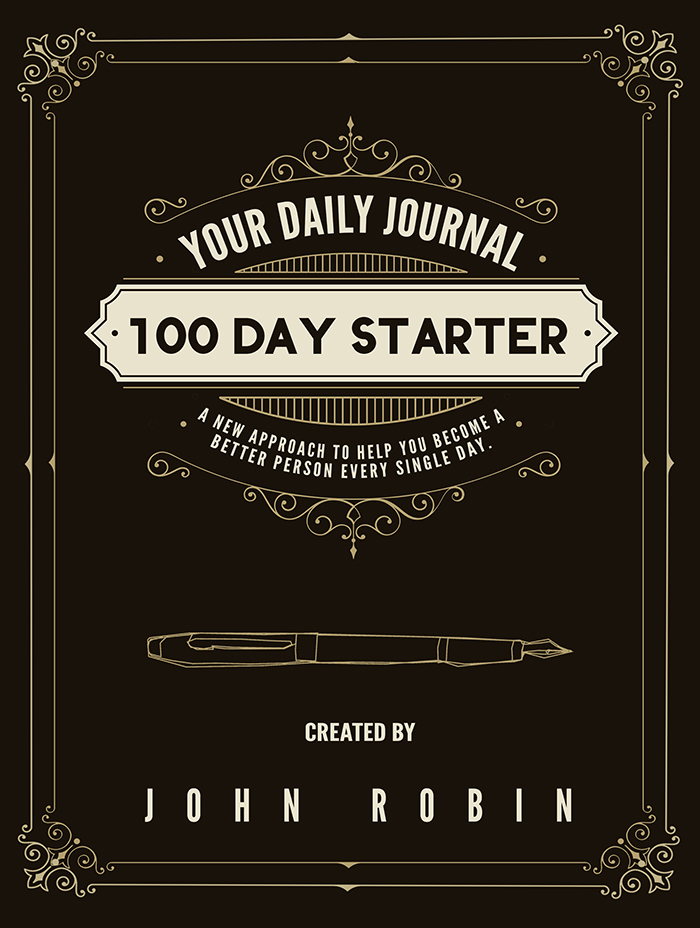Welcome to another installment in the World Builders series, where I connect with fantasy, and occasionally other speculative fiction authors to explore the process of creating a believable and immersive imaginary world.
Today I continue with the special segment of World Builders where, on Mondays and Fridays, I will feature one of the many talented fantasy and science fiction authors on Inkshares who I’ve met through the Nerdist Collection Contest. It’s been a pleasure connecting with them and receiving such generous support for Blood Dawn and I wanted to share their talent with you here.
Today, I welcome Rick Heinz, a fellow Inkshares fantasy author who was excited to share about his process.
 Rick Heinz is a fantasy author who lives within his own twisted imagination. His early career started with countless hours of caffeine injections and Diablo. After an introduction into the world of storytelling, Rick began work writing and telling stories in person.
Rick Heinz is a fantasy author who lives within his own twisted imagination. His early career started with countless hours of caffeine injections and Diablo. After an introduction into the world of storytelling, Rick began work writing and telling stories in person.
In his professional life, Rick has led a decade long career as an electrician and estimator. With the skillset as a master of electricity, a robust lesson in politics, and learning the power of the almighty deadline, he set down to turn all of his short stories and creations into a novel. Thus was born The Seventh Age: Dawn.
I asked Rick some questions about his world building process, and am excited to share his answers with your below. Be sure to also check out his book, The Seven Age: Dawn, now funding on Inkshares.
#1: What is the appeal of world-building to you? How does it compare to the importance of character and plot?
I view the world as a sandbox that the characters play in. Bringing any reader or listener into a story requires you draw them into the scene. The appeal of world-building to me is the thought of drawing someone into a scene so thoroughly they forget their surroundings. That and the occasional bout of random inspirations are also fun: “Holy crap! Imagine a fight scene there while that steel is being melted in a furnace!”
I enjoy a good amount of urban exploration in my career. So there is a strong desire for me to go find real things, and then turn them into something new.
As for comparing it to the importance of character and plot: world building is part of character development in plot. The environments characters grew up in helps shape who they are.
#2: What aspects of the world do you have to figure out before you start a story? What do you allow to unfold as you write?
For me, I need to imagine the five senses. I need to be able to visualize standing there. An example would be walking through a marketplace on mars. What is the lighting like? Neon signs popping out like spam emails? The smell of cooked alien critters? The sound of a people shouting over each other while music plays in the background. Can the person in the scene taste the dust in the air or over-purified oxygen? If he put his hand on a wall what does it feel like?
The details of those five senses are what unfold as I write, but before I begin, I imagine walking through it.
#3: Do you have a technique for keeping track of world-building as you go? How do you ensure your material is easily retrievable and easy to modify?
I use google docs for all of my writing. I have files of images stored in folders and theme music for each of my areas. I don’t have each area filled out with every item that is there, only lots of inspiration and an idea.
However, I do consider factions and political conspiracies to be part of world building as well. For this, I maintain a spreadsheet with each company, or faction, or army, or rebel group. I toss in all the characters related to that faction and have a description with their overall goal throughout the story. As I flesh out the book and the world, I’ll often pop open their spreadsheet and toss in a line. Sometimes during review I’ll go back through and make sure each group is staying true to their overall goal. In a way, the groups are both settings and characters themselves.
#4: How do you avoid excessive world-building and balance it with the act of writing the story?
By keeping in mind that the world is a sandbox the characters play in. Sometimes the story will only take place in a single room. Or it could be two entire kingdoms waging war. I find it important to have very loose goals for each of the parts in the world, but only worry about specifics that relate to the actual story. By viewing it like a sandbox allows me to take the mindset of: “These characters are going to play with their ball by themselves over here in this corner.”
This allows me to focus on the story, while still having a rich world with tie-ins to other parts of the sandbox.
#5: What do you enjoy the most about world-building?
Escapism. At its purist form, world building is a way to get lost in your own imagination. It’s totally selfish, but I’ll find myself in the car daydreaming about running around in these scenes or being one of the characters. Finding music, inspiration, pictures, or even exploring real life areas that inspire me makes life an adventure. There are many fantastic creations, myths, legends, and even awe inspiring real life modern creations of science.
Ever fly on a plane? Did you ever stop to think … I’m on a chair hovering above the earth which is spinning on its own below me while zip through the air? I love world-building because it allows me to find wonder in everyday life as well.
#6: Have you learned tips on world-building from other authors in your genre? If so, what are they?
The biggest tip was reading Stephan King’s On Writing. Put your desk in a small corner, and bringing your inspiration from life to the paper, rather than the other way around. Eclipse Phase by Posthuman Studios really highlighted to me the merits of having a bunch of sandbox areas, then the challenge of taking characters from different sandboxes and having them work together. Roleplaying games are the kings of world building in my opinion. The act of being a storyteller or any GM guide out there has mountains of tips on world-building.
#7: How has your world-building process evolved over time?
The biggest evolution is actually the LACK of initial detail. When I first started up I would spend all the time building maps, with items, characters, setting pieces. I would have pages and pages of descriptions with reference guides to what was there. I’ve would even go so far as to write full histories for each area. As time has gone on and I’ve developed more and more worlds for different settings, I’ve learned I didn’t need all of that. What I really needed was enough of an idea and inspiration material for that world so I could walk around it in my head.
Telling a few stories and working very closely with readers and fans also helped immensely. Letting them pitch their own ideas and working with them really upped my diversity of any world setting. We live in our own heads, sometimes a little bit of crowd sourcing in world development REALLY adds color and uniqueness to different parts of the world.
#8: What are some fundamental rules to world-building you would say are important to every writer in the fantasy genre?
Hrm. A question to create a set of rules for every writer in the fantasy genre? A genre about taking the impossible, completely insane ideas of magical creatures, myths, and folklore and spinning them into a tale we can relate to and allowing a reader to visualize the world….
Three things: Dream big. Look at your world like a character. Ignore the first two rules.
This is fantasy, nothing applies across the board. Inspiration, neat ideas, and thinking outside the box are what make fantasy and science fiction different from other genres.
#9: Describe your world and some of the considerations behind it that you feel give your stories a solid sense of realism:
My current world, The Seventh Age, is the modern world. Nothing could be more real. However there are multiple factions behind the scenes that are working to change that very statement. I’ve started with something very real, and my characters in the world are working to tear it down, or patch it back up. As the novel progresses each side has their own agenda and the world changes based on the characters actions.
Further on in the timeline as books progress, the world changes based on the rise or fall of characters and their factions. I feel that my world lives and breathes with the characters. It evolves based on the consequences of their actions. This helps ground all the magic, myth, and wonder in it.
If a warlock cast a spell to rip out the souls of everyone in an office building downtown today, what would happen? That’s the focus of my world and story. I can’t talk much about the world however without giving away the plot. Rooting for different sides of the coin that are trying to change or keep the world is a lot of fun. What the world looks like in the next book … well … ask me after you read The Seventh Age: Dawn.
#10: What tips do you have for aspiring fantasy writers on how to create a solid, believable world?
Start off with what you know first. If you find spiders scary, work with them. Let them grow into your mind. Because you are actually afraid of them and have first-hand experience with them, it will come through in your writing. Heck, you may even appeal or find a fan base based on this.
Thanks, Rick, for sharing so many insights on world building!
Now here’s the great urban fantasy book that’s come from Rick’s world building endeavors:
 What happens when your street-taco vendor sees a scuttling demonic imp? Find out as heretics work to usher in the Seventh Age, bringing forth the reign of Demon Kings and Magic.
What happens when your street-taco vendor sees a scuttling demonic imp? Find out as heretics work to usher in the Seventh Age, bringing forth the reign of Demon Kings and Magic.
The Seventh Age: Dawn is currently being crowdfunded on inkshares.com and is one of the top entrants in the Nerdist Collection contest. Find out more about it here.
Here is a short excerpt:
O’Neil placed a towel over his arm and rocked back and forth on his feet, letting the silence sit while he contemplated. His gaze wandered across the entire bar before finally resting on Mike with a wry grin. “People like you are born once a decade. You never even know it, but Lady Fate will spin you into action one way or another.” O’Neil grabbed the bottle from Morris without further protest and slowly poured the thick black ichor into Mike’s glass. So drink up.” He gestured to the black whiskey in front of Mike.
Mike slowly raised the glass and took a sip. It tasted like an incredibly sweet peach, with a fiery burn as it went down. He licked his lips and held up the glass for closer inspection. “What the hell is this?” Poison probably, now he’s going to say if I don’t accept his offer, I don’t get the cure. I am way too tired to be doing this. He didn’t feel tired however. He felt as alive as ever, the pain in his wrists and legs washed right out of him. A sense of renewed vigor filled him.
“Demon’s blood.” The bartender said. “Has a different effect on everyone. Kills some people and gives others strength. It only lasts as long as the blood is in your system. Takes a few days to set in as well. You’re gonna take that bottle home and finish it off. I’ve already taken the liberty of getting you a replacement for your job. Daneka is going to stay with us for a while and study his father’s missing notes. You figure out if you like where you’re life is going and make your own choice. Morris will get you a cab home. The sun is coming up soon. When you’re ready to talk again, we’ll be here Kid. Remember though, it’s okay to gamble with your life, but Lady Fate will make you pay thrice if you gamble with others.” He reached over and rubbed Mikes head like a father tussling up his kids hair. “Hey, you’ll be fine. Your life is going to come into focus. Now get outta here before my associates decide to make a meal out of you.” He smiled and nodded over to Morris.
Mike began to feel more than a bit drunk, and was grateful for Morris helping him outside into a cab. He didn’t pay attention to the instructions, he didn’t remember what Morris told him, and he didn’t notice skinless Frank driving him home and tucking him into bed. Mike only noticed that he felt like a paradox. Half wanting to scream and shout at the world, and half wanting to cuddle up with his pillow and sleep. At least I brought clean underwear… was his last thought of the night.
If you enjoyed what you read here and would like to help bring this book to life, please go over to Inkshares cast your vote by pre-ordering a copy.
Inkshares is a crowdfunding publisher who chooses which books to publish based on whether enough readers have shown interest in them. Successful projects have been reviewed in the NYT, US Today, and Washington Post, and have been distributed to numerous bookstores including Indigo and Barnes & Noble.
You can connected with Rick on Twitter: @crankybolt
Rick will also be around to answer questions and comments, so please feel free to leave a comment below.

